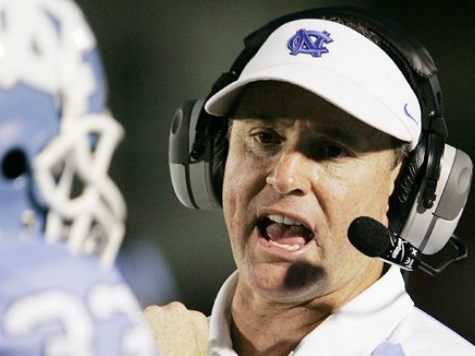The University of North Carolina Tar Heels won three NCAA men’s basketball titles as their players cheated their way to eligibility. The academic misconduct of players past may turn the dreams of a 2016 NCAA title of players present into a nightmare.
And given the malfeasance involves the football team and other varsity programs, the UNC athletic program likely faces lean times.
UNC acknowledged receiving notice Friday from the NCAA of possible infractions violations. UNC-Chapel Hill Chancellor Carol L. Folt and Director of Athletics Bubba Cunningham issued a joint statement explaining their reasons for keeping the content of the notice secret for now:
We take these allegations very seriously, and we will carefully evaluate them to respond within the NCAA’s 90-day deadline. The University will publicly release the NCAA’s notice as soon as possible. The notice is lengthy and must be prepared for public dissemination to ensure we protect privacy rights as required by federal and state law. When that review for redactions is complete, the University will post the notice on the Carolina Commitment website and notify the news media. When we respond to the NCAA’s allegations, we will follow this same release process.
Consistent with NCAA protocols, the University cannot comment on details of the investigation until it is completed.
The academic misconduct scandal, embroiling professors and bureaucrats as well as students, lasted at least 18 years. It primarily involved no-show classes and easy-A paper assignments. The school’s African and Afro-American Studies Department allegedly oversaw the scheme to keep at-risk athletes eligible. Though athletes make up about 4 percent of the student body at UNC, they composed nearly half of the 3,100 undergraduates taking the bogus courses.
The UNC-authorized Wainstein Report noted of Debbie Crowder, an office worker in the African and Afro-American Studies Department allegedly overseeing some of the fraud courses:
Specifically, she designed and offered what are called “paper classes.” These were classes that were taught on an independent study basis for students and student-athletes whom Crowder selected. Like traditional independent studies at Chapel Hill or any other campus, these classes entailed no class attendance and required only the submission of a single research paper. Unlike traditional independent studies, however, there was no faculty member involved in managing the course and overseeing the student’s research and writing process. In fact, the students never had a single interaction with a faculty member; their only interaction was with Crowder, the Student Services Manager who was not a member of the University faculty.
With such evidence already outlined in the Wainstein Report, punishment—to numerous sports programs at UNC—may arrive swiftly. The NCAA ruling could also tarnish the legacy of the late Dean Smith, who coached the men’s basketball team as the cheating allegedly began. And with Syracuse University receiving a postseason ban after the NCAA found it guilty of far lesser crimes, Tar Heels fans may need to brace themselves for a seismic punishment.

COMMENTS
Please let us know if you're having issues with commenting.